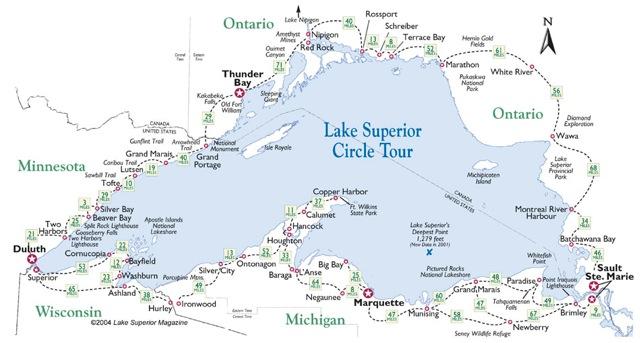|
Why it's called Lake
Superior
Lake Superior contains ten percent of all the fresh water on the planet
Earth.
It covers 82,000 square kilometers or 31,700 square miles.
The average depth is 147 meters or 483 feet.
There have been about 350 shipwrecks recorded in Lake Superior
Lake Superior is, by surface area, the largest lake in the world.
A Jesuit priest in 1668 named it Lac Tracy, but that name was never
officially adopted.
It contains as much water as all the other Great Lakes combined, plus
three extra Lake Erie's!
There is a small outflow from the lake at St. Mary's River (Sault Ste
Marie) into Lake Huron, but it takes almost two centuries for the water
to be completely replaced.
There is enough water in Lake Superior to cover all of North and South
America with water one foot deep.
Lake Superior was formed during the last glacial retreat, making it
one of the earth's youngest major features at only about
10,000 years old.
The deepest point in the lake is 405 meters or 1,333 feet.
There are 78 different species of fish that call the big lake home.
The maximum wave ever recorded on Lake Superior was 9.45 meters or 31
feet high.
If you stretched the shoreline of Lake Superior out to a straight line,
it would be long enough to reach from Duluth to the Bahamas.
Over 300
streams and rivers empty into Lake Superior with the largest source
being the Nipigon River.
The average underwater visibility of Lake Superior is about 8 metersor
27 feet, making it the cleanest and clearest of the Great Lakes.
Underwater visibility in some spots reaches 30 meters.
In the summer, the sun sets more than 35 minutes later on the western
shore of Lake Superior than at its southeastern edge.
Some of the world's oldest rocks, formed about 2.7 billion years ago,
can be found on the Ontario shore of Lake Superior.
It very rarely freezes over completely, and then usually just for a few
hours.
Complete freezing occurred in 1962, 1979, 2003 and 2009. |



